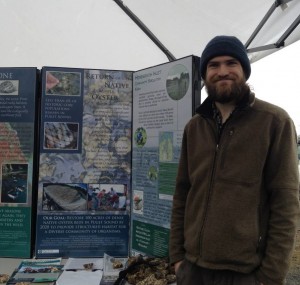
Derek King ’14 representing Puget Sound Restoration Fund at an Olympia festival. Photo Credit- Shayna Brooks
Author’s Note: As a student at The Evergreen State College from 2011-2014, I was a co-coordinator of the Evergreen Shellfish Club. We both proudly graduated in March 2014.
Later this month, Derek King ’14 will present at the annual Pacific Coast Shellfish Growers Association national conference in Vancouver, WA. A Program Technician with Puget Sound Restoration Fund, it’s no coincidence King is at the cutting edge of his field despite just being out of school. While he started with an environmental visual journalism focus, the common thread among his work and play was always the ocean.
He credits The Living Shore by Rowan Jacobsen, the Evergreen program Making a Difference with Gillies Malnarich and Emily Lardner, and contract sponsors Cindy Beck and Erik Thueson, who made the work possible by providing the perfect opportunity to dive into the obscure field of shellfish restoration and community shellfish farming. Three years later, after having navigated the trials of independent learning contracts and founding the Evergreen Community Shellfish Garden, King is teaching lessons he learned at Evergreen to students, growers and ecologists from across the country.
After King worked with student peers to start the garden, and a student club to support the community project, he turned his focus to his Bachelor of Science and Arts degree and his research on ocean acidification. King has seen the negative impacts of changing ocean chemistry on oysters, which he references as the canary in the coal mine, from the tidelands to the lab, and directed his work toward assessing and predicting the impact of ocean acidification on the effectiveness of oyster’s predators.
Work these days for King consists of managing the only public community shellfish farm in south Puget Sound, and countless other native species and habitat projects. Despite the long hours and cold, wet nights spent on the tide flats of Puget Sound, King wouldn’t rather be doing anything else. “Our water quality directly impacts our access to healthy marine resources and the bounty it provides,” he bellows, “and I’ve seen that connection first hand change people’s behavior. That’s why I do this.” As much as any recent alumni can, Derek King is saving the world, one oyster at a time.

